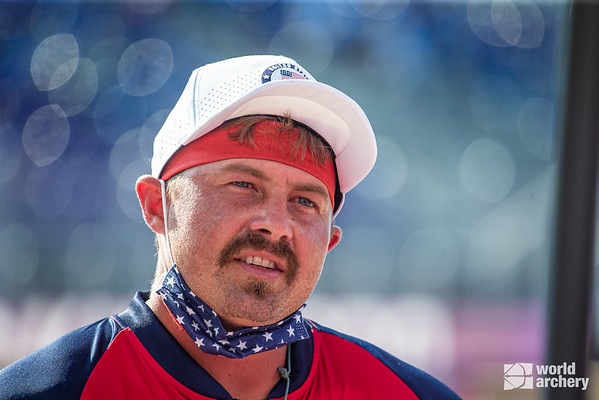The heat was back with a vengeance. The cicadas screamed. The arena baked. Just a handful of archers were left, warming up on the ranking field, waiting to be led by a crew of helpful volunteers down the long blue path towards whatever destiny awaited.
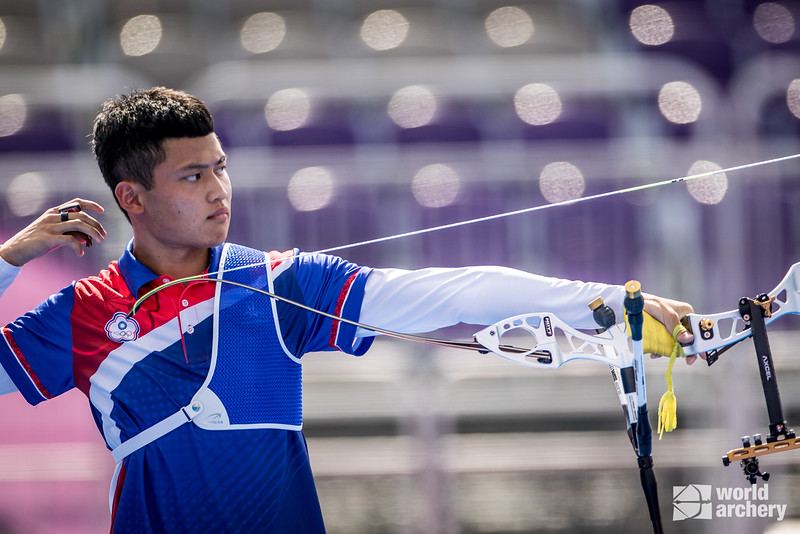
The morning truly began with perhaps the ultimate statement of intent from Kim Woojin; a perfect round, three ends of 30. This has never been shot in Olympic competition before, and remains an extremely rare occurrence outdoors. The unlucky recipient was 2019 world silver medallist Khairul Mohamad, who shot a more-than-respectable 27, 27 and 29, which looked oddly inadequate against such a monster score.
Woojin immediately installed himself as favourite in the top half of the draw. For now. The other fascinating clash of the morning was between the two Americans – and Olympic Village roommates – Brady Ellison and Jacob Wukie. Both shot well, Brady was good if not spectacular and Wukie was still very much in touch until an eight in the last end left him too far back, and Brady closed out with a 30. A wistful, almost teaful Wukie afterwards detailed how it was probably going to be his last major competition; keeping family and a job going were just too tough. He was also unable to go to the World Championships in Yankton in September, not having had enough time to take off to shoot the trials. But it would be Ellison going through.
Others that fell by the wayside included Taylor Worth, Ilfat Abdullin, Atanu Das, and surprise last sixteener Itay Shanny of Israel, who pushed Tang Chih-Chuh of Chinese Taipei to a shootoff. Itay had already made history as the first archer from Israel to go to an Olympics, and had acquitted himself exceptionally well.
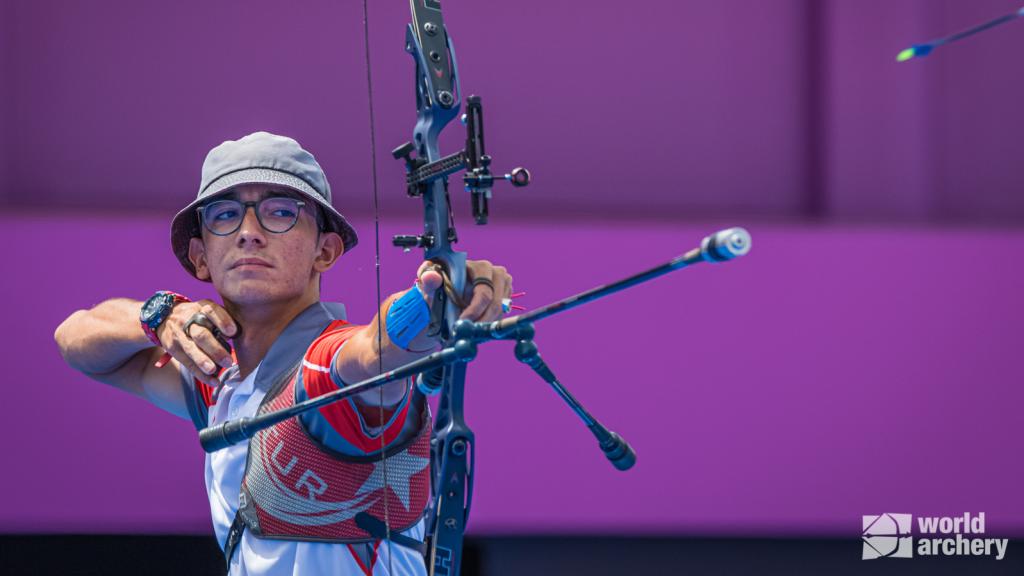
The long, long break between the two sessions beckoned. The heat built in the park. No one was really prepared for quite what was to come, even if it was clear that it was difficult to wedge anything between the last eight men, and at least three of the quarterfinal matches were probably too close to call. Many had predicted a Kim Woojin vs Brady Ellison final. Kim Woojin, the last Korean man left in the draw, would surely take out the young Taipei archer in front of him, and finally put himself in a position to take the biggest medal missing from his trophy cabinet. But… no. Tang edged out Woojin in five closely fought sets; the last, where the Korean opened with a woozy eight and nine, sealed the deal.
For the first time since 2004, there would not be a Korean man in the last four. An even bigger hole was left in the draw when Brady Ellison exited to Mete Gazoz just a few minutes later. Throughout, Ellison didn’t radiate his usual control; his shoulders seemed a little slumped, and his timing seemed long and awry. The scores were respectable, but Gazoz was on fire, closing with a 27 and a 30 to Ellison’s 26 and 29. Gazoz then smashed through Takaharu Furukawa, even if, 5-1 up, he then let him back in the door for another set. But only one.
This meant that bronze was an all-Asian powerhouse final between Tang and Furukawa, where neither archer gave each other any quarter. (The biggest surprise was that neither of the archers was Korean.) Furukawa hit the turbo boosters in the fourth set with a pugnacious display. Tang was unlucky not to walk away with anything, given the quality of his showing.
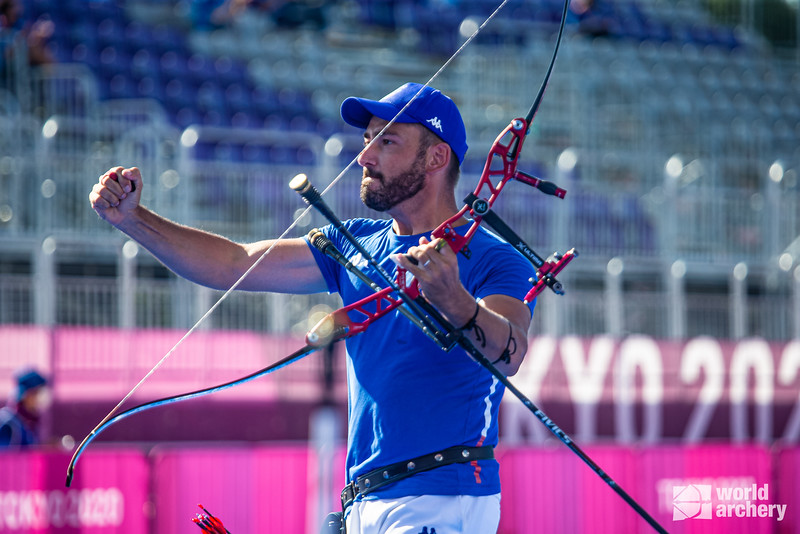
Mauro Nespoli, he of the highest poundage of all, had hit the kind of top level pro groove this week that had taken him to multiple European titles, even if he has often come undone – some say because of nerves – against the biggest fish. Here, he had edged out Marcus D’Almeida and Florian Unruh, and found 29, 28, 29 and 29 to barely push out Tang Chih-Chun. The fist was pumping.
It was time for gold. Mete looked a little tight in the first, but there were no doubts. Mauro seemed to have eliminated whatever had shredded a couple of previous attempts on big stages. He took the first with a 29, they split the second, and then Mete found the ten ring with his second arrow in the third to tie it all up. Both men shot a mighty 29 to split the fourth and set up the critical fifth set.
Mete sent down a nine, and then, Mauro blinked. A big intake of breath, and he recomposed himself. He thought about it. Disaster. An eight.
Mete sank a pressure ten. So did Mauro. And then Mete… found the ten that would be enough, turned, and jumped in the air. Mauro still had to shoot, a lonely desultory eight, that did no justice to the match or his performance.
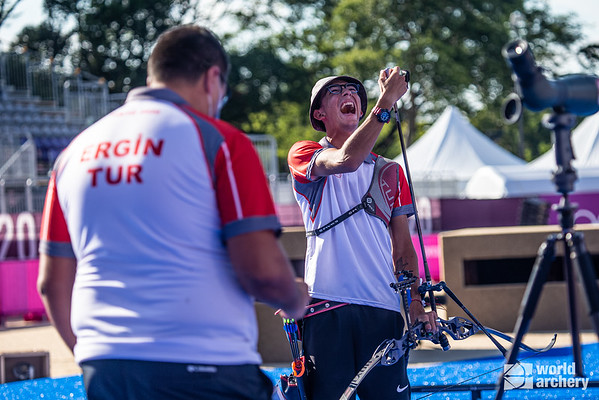
It was done. He did The Pose, as assorted Turkish Olympic dignitaries swarm the field. Mete, the gawky kid, had become the hero of the nation.
For Turkey, it was their first Olympic medal in archery – ever. It is also the first Turkish gold medal of the Tokyo 2020 games, in any sport. Mete and Yasemin Anagoz had of course come agonisingly close earlier this week, finishing fourth in the mixed team competition. “We’ve waited 100 years for this,” said Goktug Ergin, the Turkish head coach.
Mauro Nespoli smiled his way through it, but seemed almost to sigh at the ceremony picking up his silver, and did the de rigeur medal biting, through the most gritted (literally) of teeth. It was almost his. But it wasn’t. “I can tell you that I am very happy indeed to have won the silver medal. I didn’t lose the gold medal. I think there’s been a constant growth in my performance, I’ve reached higher and higher levels, and I’m very happy to have reached this level of concentration. I think I did pretty well, so I’d just like to say congratulations to myself.” he told an amused press room afterwards.
Furukawa, the consummate professional, was calm. He became only the fourth archer to collect multiple medals in the event in the modern era, after Darrell Pace, Giancarlo Ferrari, and Hiroshi Yamamoto, who took two medals an extraordinary twenty years apart in 1984 and 2004 (and even tried to make the Japanese team for this event).
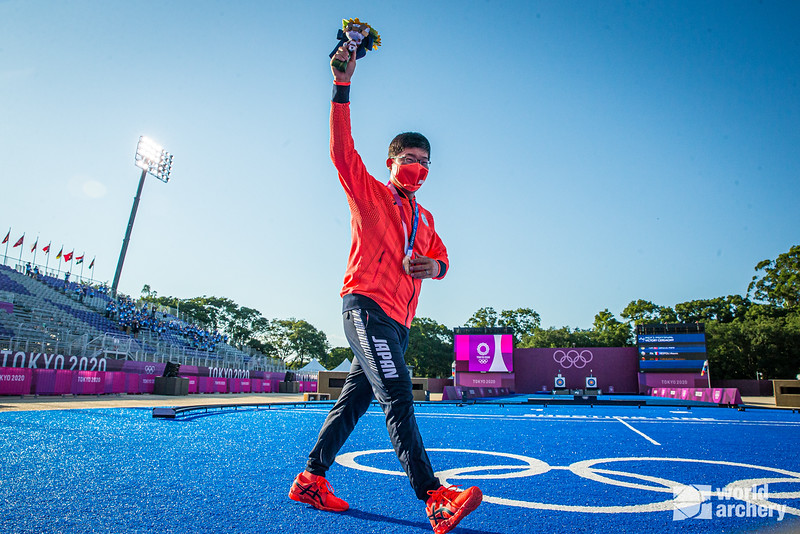
The victory for Mete is a triumph for the usual suspects: raw natural talent, plenty of sponsorship and funding, immense amount of hard hours put in, and dedicated coaching. Indeedn, it seems impossible, sometimes, to untie Mete from the big figure of Goktug Ergin, his coach, and essentially in loco parentis. Ergin, who competed for Turkey at Beijing in 2008, has never been in doubt: “This was our biggest goal, always, to get any medal. The first medal in Olympic history. This will give us new vision, a new target. The next goal is to be here at the Olympics with a team, and be a real contender, with the teams.” he said.
After running the broadcast media gamut, the slim figure of Mete slips into the mixed zone almost unnoticed. There’s only Bow and a single Turkish journalist on the rail. Clearly, the Turkish press haven’t arrived. Mete beams at us, gold medal jingling around his neck. I think I will have to call his coach for language help, but he shouts: “I speak English now!”. Another new skill.
Did you dream anything last night? “Yes! I dreamed I must win the next Olympic Games.” How does it feel to win gold? “So good. So beautiful… I don’t know, actually. I think my mother and father will be screaming at the TV.”
“The last five years, I’ve been thinking about this medal. Every day. In my mind, I shot tens. Like this. Ten. Ten.” And now? “In two months we have World Championship. I want to win it. I mean, why not? Why not?” Why not, indeed.
The competition concluded with the men’s event today.


